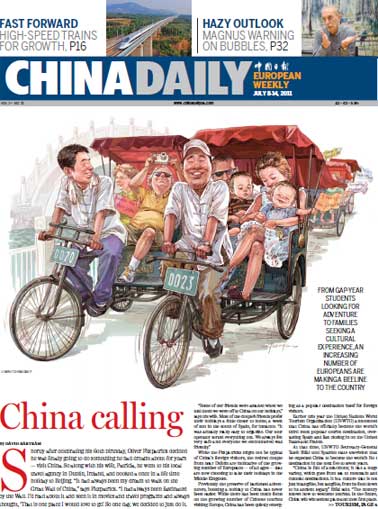Op-Ed Contributors
CPC recharged for the future
Updated: 2011-07-14 07:57
By Chung-Yue Chang (China Daily)
China celebrated the 90th anniversary of the founding of the Communist Party of China (CPC) earlier this month; in fact, the celebrations continue. The history of the CPC is the history of modern China. The sum total of the CPC history bespeaks of glory and enormous success. Along the way, however, it is also a history full of unimaginable sufferings, self-corrective struggles and heroic sacrifices.
Hu Jintao, general secretary of the Central Committee of the CPC, gave the keynote speech at the July 1 grand CPC anniversary gathering at the Great Hall of the People. The speech traced the CPC's history, but focused on the CPC's future: development, challenges, and visions for a continuing modernizing China.
The speech is comprehensive, but its overall focus is on the welfare of the Chinese people. The word "people" appears no less than 136 times in the speech. The CPC was founded for the people, and its operation is "firmly relying on the people The only interests the Party has are those of the people, and it does not have special interests for itself."
Thus, an important way to build a vibrant future for China, according to Hu Jintao, is for the CPC to follow "the principle of putting people first and governing for the people", which "is what the Party is all about".
This principle is not new. It adheres to the basic Marxian viewpoint on the people. It also reflects the basic ancient political ideal of China. Now, at the beginning of the second decade of the 21st century, the CPC will continue to put people first by developing China. According to Hu, the CPC "must promote China's future development by continuing to carry out reform and opening-up". Here are the reasons why.
The enormous success of China's "reform and opening-up" is because of the introduction of two innovative China-specific economic-political guiding practices: "socialist market economy" and "socialism with Chinese characteristics". Both practices are unique to China. Interestingly, viewed in combination, the two practices actually consist of "market economy" on one hand and "Chinese characteristics" on the other, bridged and supported by socialism.
China "is still in the primary stage of socialism and will remain so for a long time to come". The two practices were crucial to China's enormous economic success. Along with successes, of course, came problems, which, in this case, are mostly economic and social in character. The two practices will continue to guide China's "reform and opening-up". Given time they will also help solve problems related to "reform and opening-up".
Indicators of China's success today are everywhere: a rapidly growing second largest economy, new infrastructure, a growing middle class, improvement of livelihoods, new socio-medical programs, poverty elimination, urbanization, science and technology innovation, and decisive and effective governance.
Typically socio-economic problems also arise: inflation, unequal income distribution, widening gap between rich and poor, and dislocated and alienated migrant workers in urban centers. Improved material life also affects the CPC performance. Hu's speech warns that "the whole Party is confronted with the growing danger of lack of drive, incompetence, divorce from the people, lack of initiative and corruption".
Embracing "market economy" has been a blessing for China, but it has also created problems. It is a blessing because it has helped China to create wealth, which is market economy's forte. But it has also created socio-economic imbalances, which is also market economy's forte.
Marx is critical of market economy primarily because it causes imbalances. Marx expressed his critical stance in terms of his central concept of "alienation", a term he derived from Hegel. Alienation is the most destructive feature of market economy. For Marx, alienation is a condition of workers who do not feel "at one" with the product of their labor. Under extreme exploitive conditions they feel like dehumanized machines. Alienation exists in all market economies today, developed or developing.
The prime example of alienation in China is the workers' suicide case at Foxconn. Foxconn is a Taiwan-based global Fortune 500 electronics company operating in the mainland. Its management is known to practice profit maximization and boost productivity at the expense of workers' welfare. In eight months in 2010, 17 young workers aged between 17 and 25 attempted suicide, 13 of whom died.
Alienation can also be found among disadvantaged groups like poor farmers, migrant workers and laid-off workers. Though such things do happen in China, there is a difference. China's market economy is socialist, and China practices socialism with Chinese characteristics. Socialism, says Marx, is sensitive to alienation and socio-economic imbalances, and is impelled to act. Chinese characteristics, on the other hand, uphold the "people-first" principle, and act pragmatically to implement this principle.
According to Hu, the CPC's task is "to ensure and improve the people's well-being and promote social harmony". To resolve social conflicts such as alienation, "we should reduce and defuse these conflicts by building the material basis, enhancing moral strength, improving policies and measures, and providing a stronger institutional guarantee".
On its 90th anniversary, the CPC is ready to start with renewed vigor as its two engines, "socialist market economy" and "socialism with Chinese characteristics", are ready to roll again.
The author is a professor of Western and Chinese philosophy at Montclair State University, New Jersey, US.
E-paper

Burning desire
Tradition overrides public safety as fireworks make an explosive comeback
Melody of life
Demystifying Tibet
Bubble worries
Specials

90th anniversary of the CPC
The Party has been leading the country and people to prosperity.

Say hello to hi panda
An unusual panda is the rising star in Europe's fashion circles

My China story
Foreign readers are invited to share your China stories.
